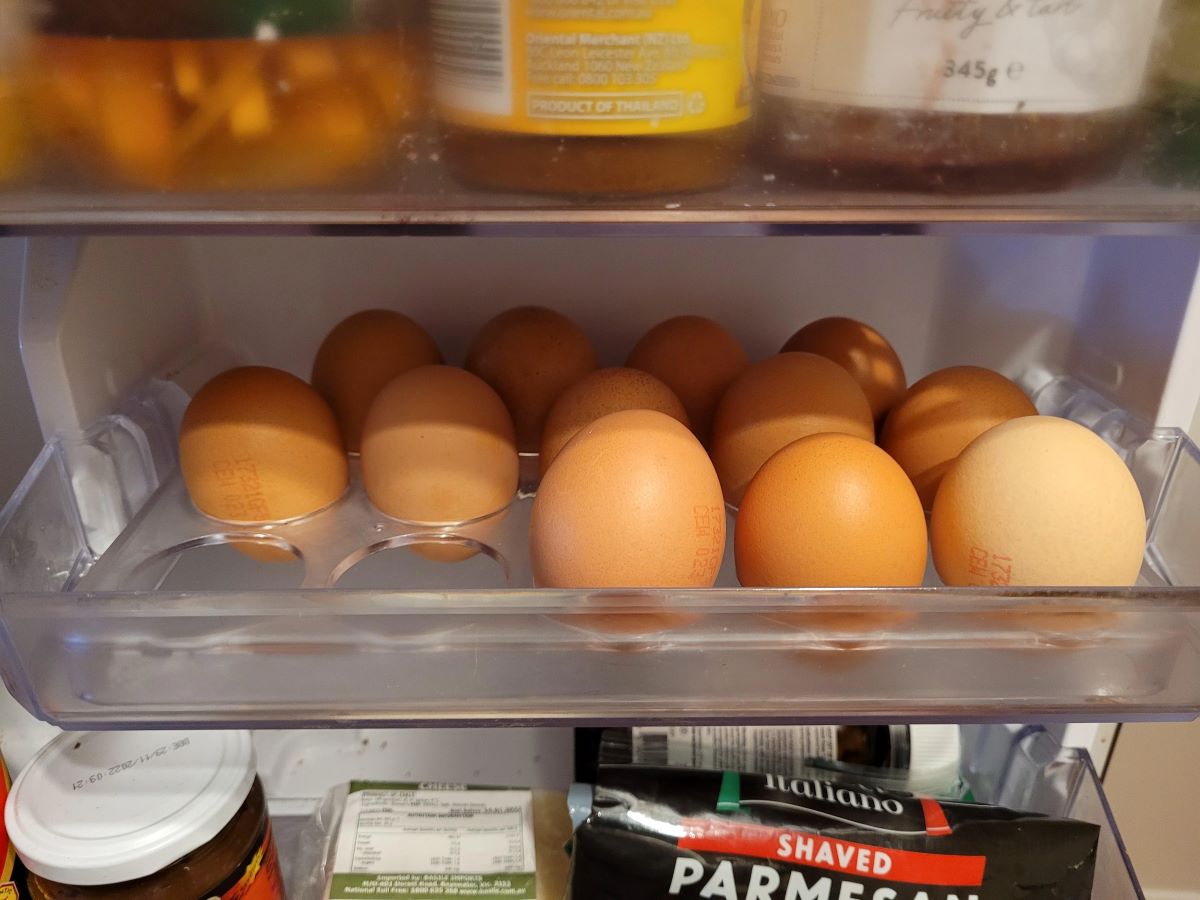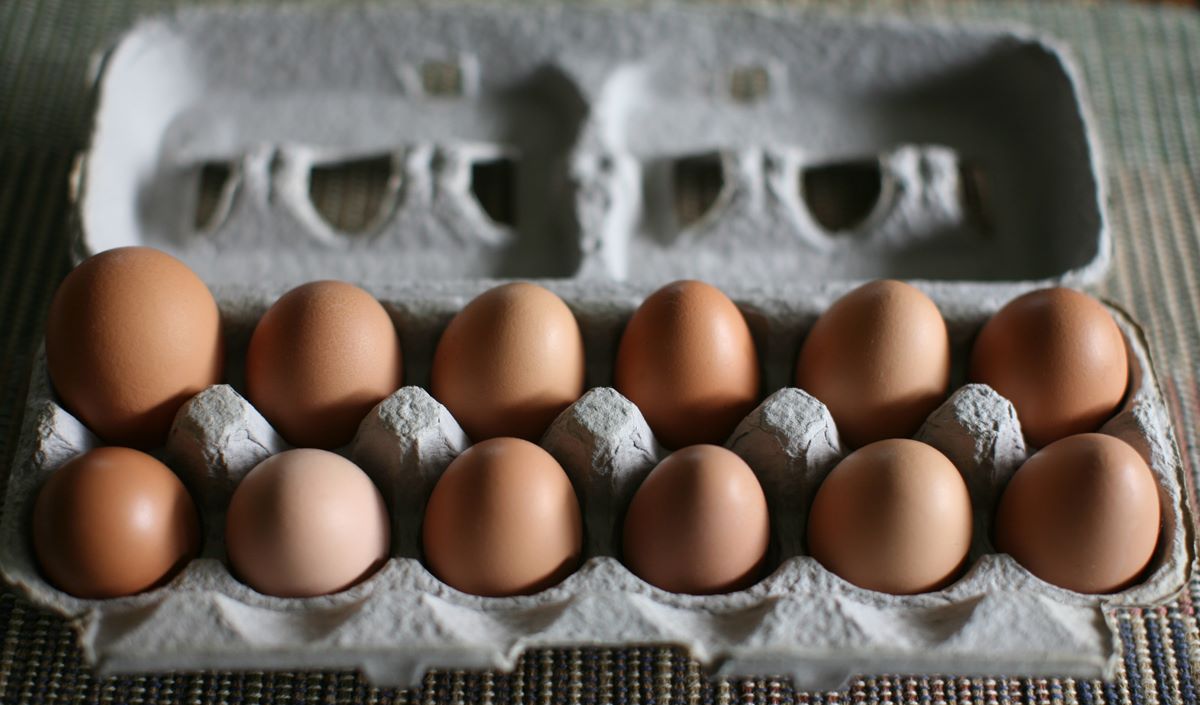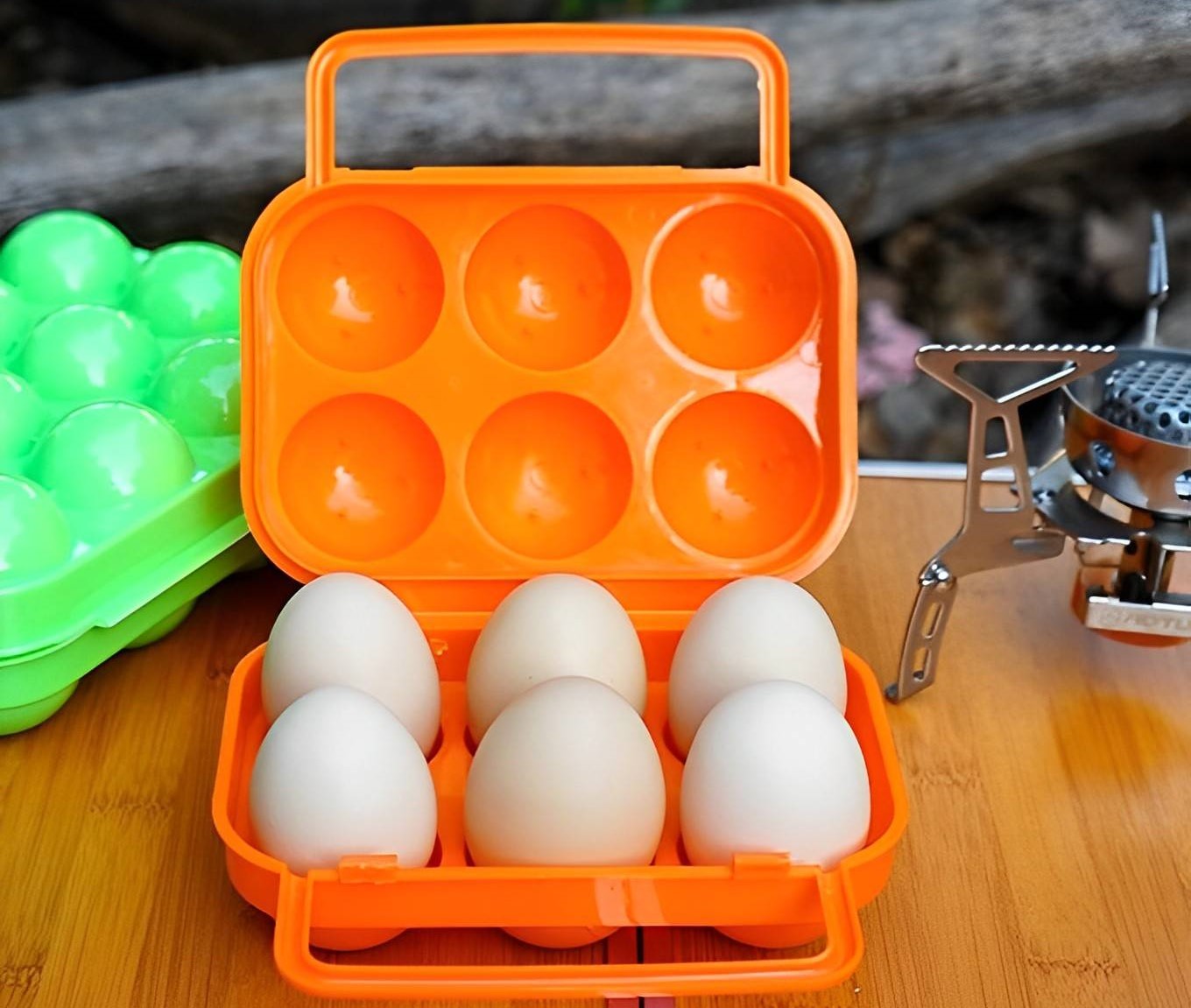

Articles
How To Store Fresh Eggs In Carton
Modified: October 19, 2024
Learn how to properly store fresh eggs in a carton to keep them fresh and safe. Read our informative articles on egg storage tips and techniques.
(Many of the links in this article redirect to a specific reviewed product. Your purchase of these products through affiliate links helps to generate commission for Storables.com, at no extra cost. Learn more)
Introduction
Storing fresh eggs properly is essential to maintain their freshness, flavor, and quality for a longer period of time. While there are different methods available for storing eggs, using a carton is one of the most convenient and effective options. Not only does it provide a safe and protective environment for the eggs, but it also allows for easy organization and identification.
In this article, we will explore the benefits of storing fresh eggs in a carton, discuss how to choose the right carton, and provide step-by-step instructions on preparing and storing your eggs. Additionally, we will share some tips on maximizing egg freshness and quality, as well as alternative methods of storing fresh eggs.
Key Takeaways:
- Storing fresh eggs in a carton provides protection, organization, and sustainability, ensuring eggs stay fresh and easily accessible. Choosing the right carton and following proper storage techniques maximizes egg freshness and quality.
- Alternative methods such as freezing, pickling, and dehydrating offer additional options for prolonging the shelf life of fresh eggs, catering to diverse preferences and storage needs. Proper handling and regular inspection are essential for safe and enjoyable egg consumption.
Read more: How To Store Eggs Without Carton
Why store fresh eggs in a carton?
Storing fresh eggs in a carton offers several advantages over other methods. Let’s take a look at some of the reasons why a carton is an ideal storage solution for your eggs.
- Protection: A carton provides a protective barrier for the eggs, safeguarding them from external elements that could potentially compromise their quality. It helps to prevent breakage, cracking, and exposure to air, moisture, and odors that can affect the taste and texture of the eggs.
- Organization: By storing eggs in a carton, you can keep them neatly organized and easily accessible. The individual compartments of the carton allow you to arrange the eggs in an orderly manner, making it simple to keep track of the freshness and rotation of your supply.
- Durability: Cartons are designed to withstand the weight and pressure of the eggs, offering a sturdy and durable storage solution. They are less susceptible to damage and deformation compared to other storage containers and materials.
- Visibility: Many cartons come with transparent lids or windows, allowing you to visually inspect the eggs without the need to open the carton. This is particularly advantageous when you have a large quantity of eggs and want to quickly assess their freshness or check for any signs of spoilage.
- Sustainability: Using a carton for egg storage is an eco-friendly choice. Most cartons are made from recyclable materials, reducing waste and minimizing the environmental impact. By opting for a carton, you can contribute to sustainable practices and help protect our planet.
These reasons make using a carton an excellent option for storing fresh eggs. It ensures the eggs retain their quality and allows for easy access and organization. Now that we understand why a carton is a preferred choice, let’s explore how to choose the right carton for your egg storage needs.
Choosing the right carton for storing eggs
When it comes to selecting a carton for storing your fresh eggs, it’s important to consider a few key factors. Here are some guidelines to help you choose the right carton for optimal egg storage.
- Material: Look for cartons made of strong and durable materials, such as cardboard or molded pulp. These materials provide sufficient protection for your eggs and are eco-friendly options.
- Size: Ensure that the carton can accommodate the size of your eggs. Different cartons are designed for various egg sizes, such as small, medium, large, or extra-large. Select a carton that matches your egg size to prevent any movement or shifting within the compartments.
- Number of compartments: Consider the number of eggs you typically store. Choose a carton with an appropriate number of compartments that can comfortably accommodate your egg quantity. Common options include 6, 12, or 18 compartments per carton.
- Lid or closure mechanism: Opt for a carton with a secure lid or closure mechanism to ensure that the eggs remain protected and sealed. This helps to prevent any outside contaminants from entering the carton and maintains the freshness of your eggs.
- Transparent window or labeling: If you prefer to easily identify the eggs without opening the carton, select a carton with a transparent window or labeling system. This allows for quick visual inspection and ensures you can keep track of the freshness and rotation of your eggs.
By considering these factors, you can choose a carton that meets your egg storage needs and provides the necessary protection and convenience. With the right carton selected, let’s now move on to preparing the eggs for storage.
Preparing the eggs for storage
Properly preparing your eggs before storing them in a carton is essential to maintain their freshness and quality. Follow these steps to ensure your eggs are ready for storage:
- Inspect and clean: Before storing, carefully inspect each egg for any cracks, damages, or signs of spoilage. Discard any eggs that are cracked or have a strong odor. For dirty eggs, gently wipe them clean with a damp cloth or sponge. Avoid using water or detergents as they can remove the protective cuticle.
- Handle with care: Eggs are delicate, so it’s important to handle them gently to avoid any unnecessary breakage. Hold the eggs with clean hands and avoid dropping them or applying excessive pressure.
- Temperature: It’s essential to store eggs at the right temperature to maintain their freshness. Aim to keep the eggs at a consistent temperature of around 40 to 45°F (4 to 7°C). Avoid extreme temperature fluctuations and exposure to heat sources.
Once your eggs are inspected, cleaned, and handled appropriately, you are ready to store them in a carton. Let’s move on to the next section and explore the step-by-step process of storing eggs in a carton.
Storing eggs in a carton
Storing eggs in a carton is a straightforward process. Follow these step-by-step instructions to ensure your eggs stay fresh and protected:
- Arrange the eggs: Place each egg gently into the individual compartments of the carton. Ensure that the eggs are positioned with the pointed end facing downward. This helps to maintain the air cell at the top of the egg, which can prolong its freshness.
- Filling the carton: Fill the carton with eggs until all compartments are occupied. Avoid cramming too many eggs into a single compartment, as this can lead to breakage. If you have additional eggs that can’t fit in the carton, consider using another carton or alternative storage methods.
- Close the carton: Securely close the carton lid or ensure the closure mechanism is in place. This helps to provide an added layer of protection and keeps out any potential contaminants.
- Labeling and dating: Optionally, you can label the carton with the date of storage. This helps you keep track of the age of the eggs and ensure proper rotation. If the carton has a transparent window, you can easily check the freshness without opening it.
- Store in a cool place: Find a cool and consistent temperature spot in your refrigerator to store the carton of eggs. Avoid placing it in the door compartment, as it is susceptible to temperature fluctuations. Instead, store it on a middle or lower shelf where the temperature remains more constant.
By following these steps, you can store your eggs properly in a carton, ensuring they remain fresh and protected. However, it’s important to keep in mind some additional tips to maximize egg freshness and quality, which we will discuss in the next section.
Store fresh eggs in their original carton in the refrigerator, with the pointed end down to help maintain freshness. Keep them away from strong-smelling foods to prevent absorption of odors.
Read more: How To Store Eggs Without A Carton
Tips for maximizing egg freshness and quality
To ensure that your stored eggs remain fresh and of high quality, consider the following tips:
- Use the oldest eggs first: When you have multiple cartons of eggs, always use the oldest ones first. This helps to maintain freshness and prevent any eggs from going bad.
- Keep the carton closed: Avoid constantly opening and closing the carton unless necessary. Excessive exposure to air and temperature fluctuations can accelerate the spoilage of eggs.
- Do not wash the eggs before storing: The protective cuticle on the eggshell naturally acts as a barrier against bacteria. Washing the eggs before storage can remove this protective layer and increase the risk of contamination.
- Store eggs in their original carton: While it may be tempting to transfer the eggs into a different container, it is best to store them in their original carton. The carton is designed to provide optimal protection and organization for the eggs.
- Avoid storing eggs near strong-smelling foods: Eggs can easily absorb strong odors, so avoid storing them near foods with pungent aromas, such as onions or garlic.
- Don’t freeze eggs in their shells: Although eggs can be frozen, it’s not recommended to freeze them in their shells. The water content in the egg expands when frozen, causing the shell to crack.
By following these tips, you can prolong the freshness and quality of your stored eggs. However, it’s important to note that there is a limit to how long you can store fresh eggs. Let’s explore the recommended storage duration in the next section.
How long can you store fresh eggs?
The storage duration for fresh eggs depends on various factors, including their quality, handling, and storage conditions. While eggs can remain safe to eat for an extended period, their quality may gradually decline over time. Here are some general guidelines on how long you can store fresh eggs:
- Refrigerator storage: When stored in the refrigerator at a consistent temperature of around 40 to 45°F (4 to 7°C), fresh eggs can typically be consumed within 4 to 5 weeks from the date of purchase or laying. The colder temperature helps to slow down the natural deterioration process of eggs, extending their shelf life.
- Judging freshness: While a carton may have a “sell-by” or expiration date, it’s still good practice to check the freshness of stored eggs before consuming them. Perform the “float test” by placing an egg in a bowl of water. If it sinks to the bottom and lays flat on its side, it is still fresh. If it stands upright or floats to the top, it is best to discard it.
It’s important to note that these guidelines are for storing eggs in the refrigerator. If you use alternative storage methods, such as freezing or preserving eggs, the storage duration may vary.
Remember, proper handling, storage, and regular inspection of your stored eggs are crucial in maintaining their freshness and safety. It’s always best to err on the side of caution and discard any eggs that show signs of spoilage or have an off odor or appearance.
Checking for freshness before consuming stored eggs
Before consuming eggs that have been stored, it’s essential to check their freshness to ensure they are safe to eat. Here are some methods you can use to assess the freshness of your stored eggs:
- Float test: Fill a bowl with cold water and gently place the egg into the water. If the egg sinks to the bottom and lays flat on its side, it is fresh. If it stands upright on the bottom or floats to the top, it is no longer fresh and should be discarded.
- Cracking and inspecting: Crack the egg onto a flat surface, such as a plate or bowl. Fresh eggs will have a firm white and a round, centered yolk that stands tall. If the white appears watery or runny, or the yolk is flattened or spreads out, the egg may not be fresh.
- Smell test: Gently sniff the egg to check for any unusual or off odors. Fresh eggs should have a neutral odor. If you detect a strong or unpleasant smell, it is an indication that the egg has gone bad and should not be consumed.
It’s important to note that these tests are not foolproof, and if you have any doubts about the freshness of an egg, it is best to err on the side of caution and discard it. Consuming spoiled eggs can pose a risk to your health and lead to foodborne illnesses.
In addition to checking for freshness, always ensure proper cooking techniques when consuming stored eggs. Thoroughly cook eggs to an internal temperature of 160°F (71°C) to destroy any potential bacteria that may be present.
By following these guidelines and conducting simple tests, you can confidently determine the freshness of stored eggs before consuming them, ensuring a safe and delicious culinary experience.
Other methods for storing fresh eggs
While storing fresh eggs in a carton is a common and effective method, there are alternative ways to store eggs as well. Here are a few other methods you can consider:
- Refrigerator door storage: If you prefer easy access to your eggs, you can store them in the designated egg compartments on the refrigerator door. However, keep in mind that the door is subject to temperature fluctuations due to frequent opening and closing, which may shorten the shelf life of the eggs.
- Freezing: If you have an excess supply of fresh eggs and want to prolong their storage life, freezing is an option. However, it’s important to note that freezing eggs in their shells is not recommended, as the water content expands during freezing, causing the shells to crack. To freeze eggs, crack them into a freezer-safe container, whisk them gently, and freeze. Frozen eggs can be used for cooking and baking purposes but may have a slightly different texture once thawed.
- Blanching and freezing: Another method is to blanch the eggs by briefly boiling them for around 1-2 minutes, then cooling them quickly in an ice bath. After blanching, you can freeze the eggs with or without their shells. Blanching helps to kill any potential bacteria and extends the storage life of the eggs.
- Pickling: Pickling eggs is a popular method to preserve them for an extended period. You can preserve hard-boiled eggs by submerging them in a vinegar-based pickling liquid that includes spices and seasonings. Pickled eggs have a unique tangy flavor and can be stored in the refrigerator for several weeks.
- Dehydrating: Dehydrating is another method to store eggs for longer durations. By removing the moisture from the eggs, you can create powdered or dried egg products that can be reconstituted later for cooking purposes. Dehydrated eggs should be stored in airtight containers in a cool, dry place.
When utilizing these alternative methods, it’s important to follow proper techniques and guidelines. Ensure that the eggs are fresh, properly handled, and stored in appropriate containers. Additionally, pay attention to recommended storage times and safety precautions for each method.
By exploring these alternative methods, you can find the one that best suits your needs and helps you prolong the storage life of your fresh eggs if a carton is not the preferred choice.
Read more: How To Store Fresh Eggs
Conclusion
Properly storing fresh eggs is crucial to maintain their freshness and quality for an extended period. While using a carton is a convenient and effective method, there are alternative ways to store eggs as well. Whether you choose to store them in a carton, on the refrigerator door, freezer, or through pickling or dehydrating, each method has its own benefits and considerations.
Storing eggs in a carton provides protection, organization, and easy access to your eggs. It ensures they stay fresh and minimizes the risk of breakage or exposure to contaminants. By choosing the right carton, preparing the eggs properly, and following the recommended storage tips, you can maximize the shelf life and quality of your stored eggs.
Remember to check the freshness of the eggs before consuming them and always use the oldest eggs first. Proper handling, storage conditions, and regular inspection are essential to ensure the safety and enjoyment of your stored eggs.
While a carton is a popular choice for storing fresh eggs, it’s important to consider alternative methods based on your preferences and storage requirements. From freezing to pickling and dehydrating, these methods offer additional options for prolonging the shelf life of your eggs.
In conclusion, by understanding the benefits of storing fresh eggs in a carton, choosing the right carton, and implementing proper storage techniques, you can enjoy fresh and delicious eggs for an extended duration. Whether you opt for a carton or explore alternative methods, maintaining the freshness and quality of your eggs is key to enhancing your culinary experiences.
Frequently Asked Questions about How To Store Fresh Eggs In Carton
Was this page helpful?
At Storables.com, we guarantee accurate and reliable information. Our content, validated by Expert Board Contributors, is crafted following stringent Editorial Policies. We're committed to providing you with well-researched, expert-backed insights for all your informational needs.














0 thoughts on “How To Store Fresh Eggs In Carton”